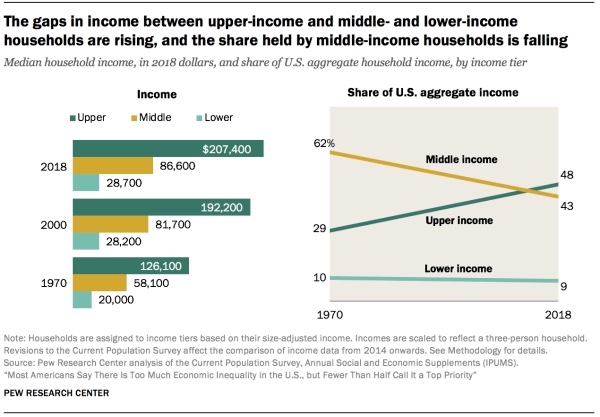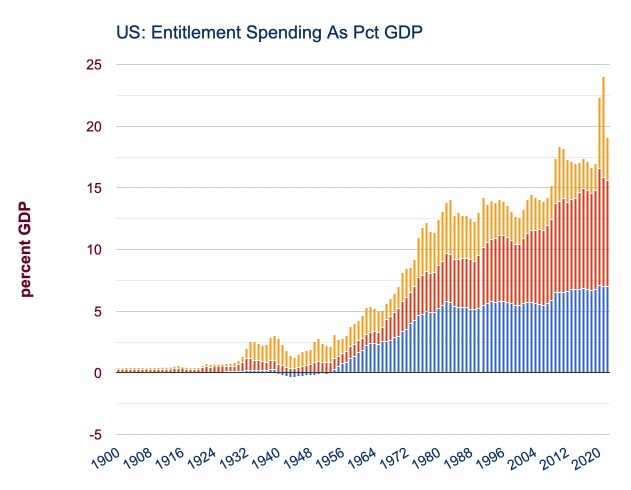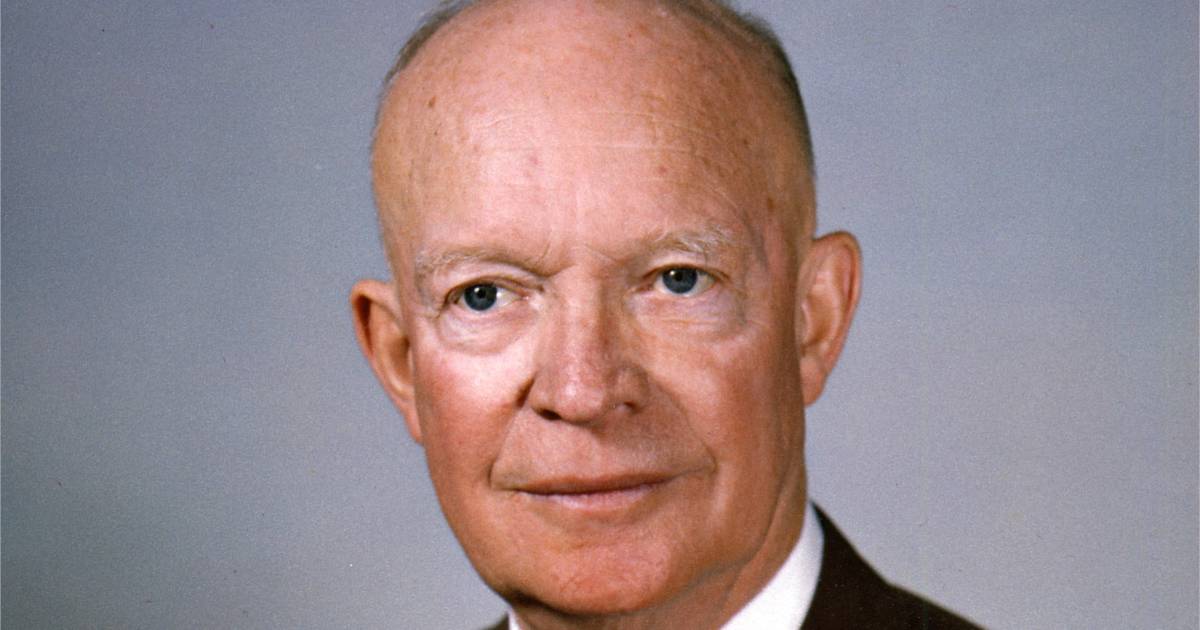This weekend, I decided to re-examine one of the most recent presidents to come out of a huge world crisis and into a bigger crisis. I wanted to refresh myself about a time period when many of our MAGA hat-wearing brethren feel was the peak of American greatness: the 1950s and leading into the 60s.
Certainly, America achieved much in the two and a half decades following World War II. But as a nation, we lived in constant fear of the competition with the Soviet Union. Above all things, the World War II generation wanted to avoid World War III, especially using nuclear weapons which most believed would ravage the world beyond habitability (and they were probably right).
We also failed to deal with some of our worst instincts, racial tribalism, bigotry, and rampant sexism. But these are not the things outgoing President Dwight D. Eisenhower feared the most—at least not in his role as a government servant. It is the ever-increasing estate of government in Americans’ lives which vexed him the most.
In January, 1961, President Eisenhower gave his farewell address to the nation. In crisp military style, he did not deliver flowery prose, nor did he rehash his extensive accomplishments. Instead, Ike, in a ten minute speech, gave the nation a warning borne of his years dealing with politicians, scientists, businessmen, and government self-interest.
Ike’s warning centered around giving too much power to any constituency backed or linked to the government. Though of “noble goals,” the impulse to use government policy to solve every problem, avoid every bad outcome, win every future war, and produce the society the current generation believes is perfect, will yield dangerous fruit.
He understood that government employees, the military itself, contractors dependent on the military, research institutions, academia, religious organizations and big business create their own powerful constituencies. To the degree these are fed, nurtured, and grown by the political class in the government, they give rise to an “elite” class.
The existence of such a class leads to a battle between rank populism and the establishment of constituencies, where their interests diverge, and a nearly unstoppable movement where their interests intersect. We can see this today very clearly as the political, technological and informational disruptions roil our nation and place our security at risk.
Eisenhower’s warning had six parts, and we have utterly failed to heed each one.
1. The temptation to spectacular action
It’s well-known that Ike held his successor, President John F. Kennedy, in low regard. “We have a new genius in our midst,” he remarked, dripping with sarcasm after Kennedy took office, “who is incapable of making any mistakes and therefore deserving of no criticism whatsoever.”
Kennedy’s moon project, now looked upon as the apotheosis of human achievement, was decried by Ike as a “stunt,” one of the “spectacular action” pits he warned against. A $28-billion odd ($280 billion, a quaint sum, today) project to unite government and private enterprise to beat the Soviets to the moon created a rather permanent lobby for “more space” (not a bad thing) and more perniciously, “big science.” It’s one thing to engage in the Manhattan Project, which had a definite outcome and deliverable assets. It’s another to create a leviathan that must be constantly fed, covered by the media, and brought out onto the public stage by presidents, legislators, and appointed officials when it suits their agenda.
Space was not the only area in which Ike’s call for “balance” was ignored, and in fact trounced underfoot.
But each proposal must be weighed in the light of a broader consideration: the need to maintain balance in and among national programs — balance between the private and the public economy, balance between cost and hoped for advantage — balance between the clearly necessary and the comfortably desirable; balance between our essential requirements as a nation and the duties imposed by the nation upon the individual; balance between actions of the moment and the national welfare of the future. Good judgment seeks balance and progress; lack of it eventually finds imbalance and frustration.
President Lyndon Johnson went big in everything he did (and the stories of his Texas-sized obsession with “big” are legion). Johnson’s “Great Society” was supposed to be the solution to poverty. After five and a half decades, the rich are decidedly richer, and a far greater share of U.S. aggregate income is in the hands of the wealthy, with just under half attributable to lower and middle-income Americans. The middle class is shrinking.

Creating Medicare and Medicaid, handing out money for housing, and funding giant welfare entitlement programs indeed did cut poverty in America.

While the poverty rate has pretty well stabilized at between 11 and 18 percent, government spending to keep it there has exploded. It’s like pouring water into an ocean: Whether it’s ten gallons or a thousand gallons, the water’s level doesn’t change.

Meanwhile, entitlement spending keeps growing at a frightening rate, crowding out other needed expenditures.

Since Ike, America has created the largest constituency in the nation’s history, all dependent on the benefits poured out from the treasury. If you’re not a direct recipient of these benefits, it’s likely in some way your business or employer (or you work for the government) gets some share of the cash cow, either from providing services to the government, to the recipients of aid, or by employing individuals who receive entitlements.
We have created a spectacular infrastructure of dependency that started as a War on Poverty and has morphed into a terrible addiction.
2. The military-industrial complex
Eisenhower warned:
In the councils of government, we must guard against the acquisition of unwarranted influence, whether sought or unsought, by the militaryindustrial complex. The potential for the disastrous rise of misplaced power exists and will persist.
Ike was well aware that the U.S. and Soviet Union were locked in a battle of ideologies, scientific research, the stockpiling of weapons of mass destruction, and the spreading of influence and raw power around the globe.
In fact, it was Eisenhower who pledged support for South Vietnam after the French debacle at Dien Bien Phu. This has led some historians to conclude that it wasn’t Kennedy or Johnson who bore the responsibility for roping us into the war in Vietnam, but Eisenhower.
I think the case for blaming Ike is tenuous at best. The Gulf of Tonkin Resolution created a situation of war that Eisenhower would certainly have found troubling, if not downright despicable.
In this document, Congress gives President Lyndon Baines Johnson sweeping authority to “take all necessary measures to repel any armed attack against the forces of the United States and to prevent further aggression.” Later, as the war in Vietnam escalated, some of those who had voted for the measure claimed that the President had exceeded his authority under S.J. 189 by waging an undeclared war, or at least had violated the intention of the joint resolution. It is clear, however, from a careful examination of the documentary record, that Congress understood the open-ended nature of the resolution as they voted on it, and that individual members either supported this transfer of constitutional authority to wage war in Vietnam or abdicated their responsibilities in choosing to disregard the implications of their vote.
Ike’s vision for the use of military force, and the building of a strong defense, did not include such open-ended authorizations for a White House directed all-out war. The use of conscripts, the accelerated development of weapons programs in order to test them on the battlefield against opposing Warsaw Bloc weapons supplied to the North Vietnamese and the Viet Cong, and the political nature of the war were the very things Ike warned against.
With a presidential election just three months away, the resolution brought with it major political benefits as Johnson was able to “wrap himself in the flag, [and] to deflect right-wing Republican challenges to his patriotism.” National prestige was also at stake, and elected officials were happy to take advantage of an opportunity to demonstrate resolve. There is no indication that Johnson was anticipating an expanded ground war in 1964, and Congress shared that belief, which made passage of the resolution quick and almost entirely without dissent. There were, however, a few voices in the wilderness, most prominently the two senators who would eventually stand alone in voting against the resolution, Wayne Morse (D-OR) and Ernest Gruening (D-AK).
Add to that the fact that the event which ignited the joint resolution didn’t really happen. Johnson and his advisers knew it.
On August 2, 1964, the American destroyer Maddox, gathering intelligence close to the coast of North Vietnam, came under attack by lightly armed patrol boats. Two days later the Maddox and the Turner Joy reported a second attack, although there was great doubt even within the administration as to whether this second incident actually occurred, and recent evidence suggests that it did not.
This template for military action without end has been cut and pasted over and over again since 1990, when George H.W. Bush authorized the First Gulf War to liberate Kuwait. Bush called off his war after just 100 hours of combat, and a resounding victory over Saddam Hussein. But many within his administration, and within the military establishment were unhappy that Bush didn’t finish the job by marching into Baghdad.
President Bill Clinton used the cover of NATO, but not Article 5 (mutual defense), to commit American air power to Kosovo, and the U.N.’s flag to commit us to Mogadishu. Both actions cost us some aircraft, equipment, and casualties. Clinton expended hundreds of cruise missiles aimed at Saddam.
Then President George W. Bush, in the fury following 9/11, began what is now the longest continuous military engagement in American history, first in Afghanistan, where finally President Biden has called an end to our presence (which, given the stability and small size of our garrison, might not have been the right call).
Only four days ago, the House of Representatives voted to repeal the 2002 Iraq War Powers Authorization of Military Force.
The Soviet Union ceased to exist in 1991. Now we face a more agile, and just as pernicious a threat in the revived Russia headed by maximum dictator Vladimir Putin, who uses economic strangleholds, open military action, and massive cyber- and disinformation attacks to thwart American interests.
We have gone completely over to creating a giant military industrial complex, complete with its own lobbying, a giant constituency, massive budgets, research and development, and super-powerful black ops that cross over into the intelligence community, the DIA, the CIA, and even domestic spying.
This form of a “deep state” has the technical resources, political connections and color of law to steer the entirety of the federal government, affect elections, and crush individuals who seek to expose its excesses. Ike would be horrified.
3. Domination of scholarship by federal projects and the power of money
Ike said:
Today, the solitary inventor, tinkering in his shop, has been overshadowed by task forces of scientists in laboratories and testing fields. In the same fashion, the free university, historically the fountainhead of free ideas and scientific discovery, has experienced a revolution in the conduct of research. Partly because of the huge costs involved, a government contract becomes virtually a substitute for intellectual curiosity. For every old blackboard there are now hundreds of new electronic computers.
In this, we’ve begun to see some areas swing back to the private sector and its innovative power. The PC revolution and the Internet has literally dialed the clock hands back to a time when “the solitary inventory, tinkering in his stop” can really have a world-changing effect. Ike would have appreciated Steve Jobs and Steve Wozniak. He would have lauded Elon Musk and Bill Gates, and even Mark Zuckerberg.
SpaceX has assumed many of the functions that NASA used to do itself by contracting to many companies, while retaining complete engineering and requirements control, much like the military. Now NASA opens the field to competition, innovation, and grants huge footprint projects to private companies.
But in the area of technology, especially the advent of social networking, the hands of the clock are swinging back to regulation and moats, like the Bell System offered a regulated monopoly in exchange for stability of service. I don’t know what Ike would have thought of Section 230, or our current obsession with “fact checking” and censorship of unapproved viewpoints.
I am fairly sure Ike would be horrified by the number of research chairs funded by China, and by the enormous logistical chains many of the largest U.S. companies have thrown over the Pacific, giving the Chinese Communist Party almost unlimited access to our trade secrets, manufacturing tech, and intellectual property.
When entertainment and sports industries kowtow to Beijing, in pursuit of new money, or in defense of existing cash flows, the domination of federal government grants, projects and money has been suborned by a foreign power. The danger of Ike’s warning is coming home to roost, not just because the campus and the leaders it produces are today’s and tomorrow’s business leaders, shaping political thought. But also because much of that power has been ceded to Chinese firms, students and nationals.
Not to mention the gigantic debt load on former and current students, and the pressure for President Biden to continue forgiving these loans. There are no controls over tuition increases at colleges because the market is non-existent. Demand is unlimited and supply is unlimited, because universities will keep spending, loaning, and nobody is interested in actually paying the bill.
4. Plundering, ease, and convenience
This is one that has Ike spinning in his grave.
As we peer into society’s future, we — you and I, and our government — must avoid the impulse to live only for today, plundering, for our own ease and convenience, the precious resources of tomorrow. We cannot mortgage the material assets of our grandchildren without risking the loss also of their political and spiritual heritage. We want democracy to survive for all generations to come, not to become the insolvent phantom of tomorrow.
If there’s a prophecy we should heed, it’s that one. More and more, since the Gordon Gekko “greed is good” 1980s, business leaders have been trained in the technical means of making money, efficiency, and innovation, but left woefully unprepared for the moral task of remaining ethnical, morally coherent, and focused on a larger, longer-range picture.
We have built ourselves a constituency of “me’s” who are focused on the moral panic of the day. As much as I think the “Tea Party,” the “#MeToo” movement, and the “#BlackLivesMatter” movement (not the organization with that name, but the grassroots movement itself), and other socially useful trends can be helpful to our society, they have become mere flamethrowers for political greed and power lust.
Meanwhile, the government is steered by polls, dark money, and connected lobbyists who live only for today, plundering. The average working person is far less financially stable than they were in Ike’s day. The government is far more burdened by debt and has mortgaged “the material assets of our grandchildren” to a degree logarithmically greater than in Ike’s term as president.
Our political and spiritual heritage is actually in danger of becoming “the involvent phantom on tomorrow.” Ike was right and we didn’t listen.
5. Becoming a community of dreadful fear and hate
Here Ike was talking about international relations, but the problem has infected us domestically also. How can we “come to the conference table” with confidence, as Eisenhower said, “protected as we are by our moral, economic and military strength,” if we ourselves are divided by dreadful fear and hate?
The danger of nationalism combined with populism is something with which Ike was well-acquainted. He saw it in the rise of the Nazis in Germany. Of course, it was a combination of factors that brought about the Nazis: Germany had lost WWI; the allies were unthoughtful and lazy in enforcing or modifying the terms of the Treaty of Versailles; broke and embarrassed, Germany’s high culture was attracted to the rise of nationalism; the inept church, the honor-bound military and the political division of the day cleared the way for Hitler; and, the European allies, once faced with an implacable opponent, chose to pacify and appease him rather than fight.
America doesn’t have anything like that confluence of events and personalities that created a holocaust. But we do have personalities and events that allowed Hillary Clinton and Donald Trump to duke it out as demagogues, both unfit to serve in the office of president, but for different reasons.
Trump, big and unstoppable, brought along with him, as FDR did in his own wake, a trail of garbage, as Peggy Noonan put it, “like the Staten Island ferry.” Absent a massive depression to be cured and a World War to be fought, such garbage sits too long in the sun and stinks to high heaven. Trump was no FDR, but he did bring his own brand of wink-and-nod constituency approval to some of the worst people. He also brought a longstanding adversarial, competitive and cruel relationship with the media.
Under the resurrected Reagan-era “Make America Great Again” banner, Trump constructed a cult of personality that defies reason, decries fact, and smashes the guardrails of good governance. His “America First” stance among nations is the opposite of what Eisenhower stood for.
As one who has witnessed the horror and the lingering sadness of war — as one who knows that another war could utterly destroy this civilization which has been so slowly and painfully built over thousands of years — I wish I could say tonight that a lasting peace is in sight.
Trump knew nothing of the horrors of war; he had instead his own “personal Vietnam” avoiding contracting an STD. Trump avoided military service under the ruse of “bone spurs.” He joked about the gravity of a Congressional Medal of Honor, while slighting many Gold Star families whose loss was real and tangible. (Notably, President Biden lost a military son to cancer.)
Before he was president, Trump told Playboy in 1990 that we’re stupid if we believe nuclear war will never happen.
I’ve always thought about the issue of nuclear war; it’s a very important element in my thought process. It’s the ultimate, the ultimate catastrophe, the biggest problem this world has, and nobody’s focusing on the nuts and bolts of it. It’s a little like sickness. People don’t believe they’re going to get sick until they do. Nobody wants to talk about it. I believe the greatest of all stupidities is people’s believing it will never happen, because everybody knows how destructive it will be, so nobody uses weapons. What bullshit.
I imagine Ike, had he been alive to witness the rise of Trump, would have placed himself in the “Never” category. He would have had the same bearing as John McCain, who despised Trump with every breath, until his own death from brain cancer.
Trump’s “fear and hate,” and that of his followers, was (is) directed at those on the political left who sought to re-engineer our society, and have disregarded many of Ike’s warnings. But Trump’s disregard for the central warning of “fear and hate” itself, and the specter of nuclear war, would have, I think, been much more jarring and concerning to Ike.
6. Abandoning “the table” for the certain agony of the battlefield
Points here for Richard Nixon, who was Ike’s Vice President. Ike wasn’t a big fan of Nixon, and famously told a reporterwho asked to name Nixon’s contributions to policy, “if you give me a week, and I might think of one.”
Nixon believed in negotiation. He and his RealPolitik Secretary of State Henry Kissinger used the military as a means of diplomacy, and diplomacy as a means of power flexing at the negotiating table. This led to some real moral crimes like the Linebacker II raids. But it also resulted in some groundbreaking deals to end the Vietnam War (or at least our involvement in it), and the opening of trade with China.
Ike’s warning included this piece on arms talks.
Disarmament, with mutual honor and confidence, is a continuing imperative. Together we must learn how to compose differences, not with arms, but with intellect and decent purpose. Because this need is so sharp and apparent I confess that I lay down my official responsibilities in this field with a definite sense of disappointment.
What we don’t see in negotiation is the endgame when war looms. We know the Russians are not afraid to use their military on their own borders, to expand their influence. We know the Chinese are building their military—most troubling, their Navy and foreign ports—at a frightening pace.
When President Obama sat with Iran and made a terrible deal that allowed the Iranians to cheat at will and pretend they are in full compliance, that was not the place for “the table.” When President Biden allowed Russia to compete its Nord Stream 2 pipeline, while canceling Black Sea naval operations in exchange for Putin’s pullback of 80,000 troops from the Ukraine border, that was not the place for “the table.”
We have so ensnared ourselves in the building of our military, and the funding of our social goals, that we have lost the confidence and moral leadership that in Ike’s day we brought to the negotiating table with both our allies and our opponents. Trump turned diplomacy with North Korea into a tabloid gossip column. He treated our allies shamefully, even while he reminded them of their obligations to our mutual treaties.
Neither the Bush “exporting democracy” nation-building, the Obama “transformational” overthrow of so many foreign governments, the Trump bull in a china shop bombast, nor the untested Biden approach would be acceptable to Ike. Perhaps that time has passed, since we no longer face a single unified enemy or worldview. We are beset with criminals, protectors of criminals, religious extremists, and outright dictators. We must deal with each in a different way, but with a common purpose, moral direction, and coherent policy. We have none of that; it’s only polling results that move our policy.
America has not only ignored Ike’s warnings from 1961; we have also willfully rebeled against them. It’s not to our credit that we failed to listen to the Supreme Commander of the Allied Expeditionary Forces who liberated Europe. It is, sadly destructive, and perhaps, to our doom.
My only questions are: Can we decide to listen now? And if we do, who will agree to listen on both sides of the political fence?
Follow Steve on Twitter @stevengberman.
The First TV contributor network is a place for vibrant thought and ideas. Opinions expressed here do not necessarily reflect those of The First or The First TV. We want to foster dialogue, create conversation, and debate ideas. See something you like or don’t like? Reach out to the author or to us at ideas@thefirsttv.com.

